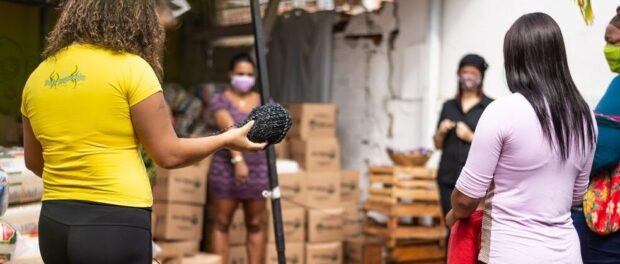
 This is our latest article about Covid-19 and its impacts on the favelas. It is also part of a series created in partnership with the Behner Stiefel Center for Brazilian Studies at San Diego State University, to produce articles for the Digital Brazil Project on human rights and socio-environmental justice in the favelas for RioOnWatch.
This is our latest article about Covid-19 and its impacts on the favelas. It is also part of a series created in partnership with the Behner Stiefel Center for Brazilian Studies at San Diego State University, to produce articles for the Digital Brazil Project on human rights and socio-environmental justice in the favelas for RioOnWatch.
A little less than a year ago, we followed the rising of a pandemic on television, watching the increasing number of cases and deaths both in and out of Brazil. The announcement in February 2020 of the first case of Covid-19 in the nation provoked a mixture of feelings, from fear to incredulity. Comprehending the gravity of the situation took time and required massive organizing to combat the understanding that it wasn’t just “a little flu.” On top of the health crisis, Covid rapidly showed its effects on the labor market and Brazilians’ income.
Before the Covid-19 pandemic arrived in Brazil, a large number of workers were already outside the formal labor market, as shown by the Continuous National Household Sample Survey (Continuous Pnad). According to this study, at the end of 2018 around 12.2 million Brazilians were unemployed. However, in 2020, under the additional economic effects of the pandemic, unemployment grew, reaching 13.9 million. During the year, the average unemployment rate was 13.5%, the largest ever registered in Pnad’s time series, which began in 2012.
Given this scenario, it is not difficult to imagine the situation of the unemployed, already making a living through informal work, or of those who run small businesses. “The crisis provoked by the novel coronavirus has affected everyone, but the impact has been greater on those who live in peripheral areas. Social inequality is increasing, and the pandemic is still far from over,” says Aira Nascimento, founder of As Josefinas Colab and Cultural Space, a social business which has peripheral women and mother entrepreneurs at its core.
Data from the Brazilian Support Service for Small and Micro Businesses (Sebrae) show that the pandemic caused a reduction in the participation of women in business. According to the research, between July and August 2020, 25.6 million people were owners of their own businesses. Women’s participation in this universe was 8.6 million, or the equivalent to 33.6%, while men’s participation was 17 million (66.4% of the total).
Greater participation in domestic tasks and additional work inside and outside the home bring women to the point of exhaustion and become contributing factors to the decline in their participation as entrepreneurs. Realizing this, initiatives like As Josefinas Colab try to help women from the periphery turn this around and potentialize their businesses.
Besides other initiatives throughout Brazil, As Josefinas Colab has launched support campaigns to benefit peripheral woman entrepreneurs, especially women from Rio’s West Zone, for instance the #SupportAPeripheralWomanEntrepreneur campaign. From April to December, 180 women were supported by the network, which in addition to baskets of basic foodstuffs offered acceptance, attention, support, and professional training.
From One Moment to the Next, Everything Stopped!
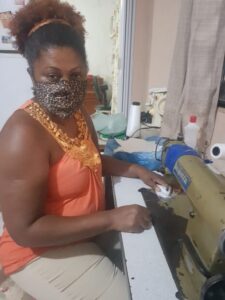 Kátia Aparecida is a black woman and resident of Santa Cruz in Rio’s outer West Zone. With a strong will to succeed, she says she was “pulled out of the darkness” by Colab. For her, the feeling brought on by the reality of the pandemic was disbelief: “in the beginning, I didn’t really believe much about it. We were seeing people die, and even so, it didn’t sink in. It was a blow to see everything closing down, people isolating themselves inside of their homes, and starting to run out of things,” she remembers.
Kátia Aparecida is a black woman and resident of Santa Cruz in Rio’s outer West Zone. With a strong will to succeed, she says she was “pulled out of the darkness” by Colab. For her, the feeling brought on by the reality of the pandemic was disbelief: “in the beginning, I didn’t really believe much about it. We were seeing people die, and even so, it didn’t sink in. It was a blow to see everything closing down, people isolating themselves inside of their homes, and starting to run out of things,” she remembers.
When the pandemic arrived in Brazil, Aparecida was working in a plastics factory. She had started the job three months prior, in December 2019. “Everything stopped, and then you looked around and noticed everything you’re lacking at home. It was despairing.” Aparecida lost her job in the factory during the pandemic.
She became acquainted with As Josefinas through a newspaper article. An item about the distribution of baskets of basic foodstuffs for women who were registered as Individual Microentrepreneurs (MEI) led Aparecida to register for the project. “I admit that I was already getting depressed, I just wanted to stay in a dark room. I was listening to the TV and I heard about the food baskets for those who were MEI in the West Zone, and they mentioned Santa Cruz. I signed up without any hope but knowing how much a basket of basic foodstuffs would help me. To my surprise, they called. What a happy day it was,” she remembers.
Besides the donation of food, Aparecida found emotional help and support in the collective. She says that being a part of this group of women gave her the boost she had been needing to leave her depression behind and move forward.
It is hard to think about new income generation activities when hunger is present in a home. Because of this, the assistance provided by As Josefinas helped Aparecida guarantee that she could feed her family. “The basket of basic foodstuffs that I received was divided with my neighbor, my sister, and also fed four people at my home: me, my son, my husband (who is also unemployed), and an aging friend who lives with us,” she says.
Resignifying Seamstress Mode
Aparecida arrived at As Josefinas because of the article on basic foodstuff donations, but she also found support and opportunity there to generate some income. As part of the network, the entrepreneur made a large quantity of face masks for a company, which allowed her to invest in her work. This opportunity gave her the impulse that she needed to buy her own sewing machine and invest in sewing and making small repairs in her neighborhood. “As Josefinas supported me with an order to produce 480 masks. With this bit of money, I was able to buy a sewing machine, since I used to have to borrow one,” says Aparecida. This was a turning point in her life.
The support from the network helped develop Aparecida’s potential. Besides being a bridge between entrepreneurs and work opportunities, the project also acts as a mentor and offers assistance to the women who are part of the network, helping them manage and grow their businesses. The awareness of the value of her work is also a part of the benefit Aparecida has reaped from the As Josefinas network.
Before participating in the project, she says she had made masks to sell to her neighbors, but as the market supply grew, the demand diminished. Today, with her own sewing machine, she has expanded her range of services. Besides making masks, she offers clothing repair, mattress covers and takes larger orders from factories. “I’m reinventing myself, right?” she says enthusiastically.
Tendência Black: When Overcoming Becomes Fashionable
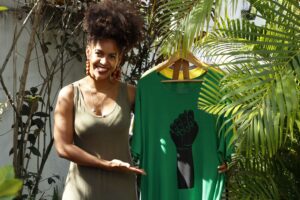 A native of Salvador, Cíntia Pereira is 32 and has lived in Rio for seven years. Together with her husband, Emanuel, she founded the store Tendência Black [Black Trend] in 2014. Their small business makes clothing with phrases and printed patterns oriented towards representation and valorization of Afro-Brazilian culture. Becoming a mother in 2018 motivated Pereira and energized the business. However, she also felt the increase in her daily workload, adding the business to taking care of her daughter and her home. “My husband had a full-time job. And I conducted the business more slowly, right? Because I also had to make the effort to be a mother and take care of the house,” she explained.
A native of Salvador, Cíntia Pereira is 32 and has lived in Rio for seven years. Together with her husband, Emanuel, she founded the store Tendência Black [Black Trend] in 2014. Their small business makes clothing with phrases and printed patterns oriented towards representation and valorization of Afro-Brazilian culture. Becoming a mother in 2018 motivated Pereira and energized the business. However, she also felt the increase in her daily workload, adding the business to taking care of her daughter and her home. “My husband had a full-time job. And I conducted the business more slowly, right? Because I also had to make the effort to be a mother and take care of the house,” she explained.
The business was developing well until the pandemic began. In March 2020, Pereira’s husband lost his job and they both became unemployed and without any fixed income. With no money, they were not able to buy materials to continue producing the clothing for their online store. Without resources to support the business and even to survive, the entrepreneur discovered As Josefinas. “We received support from the initiative, basic foodstuffs. We felt embraced. We began restructuring and reinventing ourselves and when June arrived, our sales started to grow,” she says.
For this entrepreneur, being a part of Colab was fundamental to get through this period of the pandemic: “it wasn’t just the food, it was the care and support. We saw that we weren’t alone,” Pereira recalls. Although she already knew Aira Nascimento, founder of the project, she had never participated in any of As Josefinas’ activities personally until the pandemic.
According to Pereira, her participation in the network helped her better structure the management of her business and, from a personal point of view, she says that the help from other women in the project was fundamental to strengthen herself emotionally as well as for her progress as an entrepreneur. “For the next two years, my expectation is to grow my business and generate employment.” At the moment, she runs Tendência Black alongside Emanuel, and outsources to a seamstress. “We are giving courses in silk screening to prepare more professionals to work with us. Our objective is to open a space, an atelier, above my home,” she says.
“I got everything that I needed in As Josefinas. I [get support from] the sisters that work in marketing, in photography, with audiovisual… these are difficult areas for me because, as entrepreneurs, we have to do a bit of everything for our brand. Though these are challenges for me, I can find solutions in the network,” says Pereira.
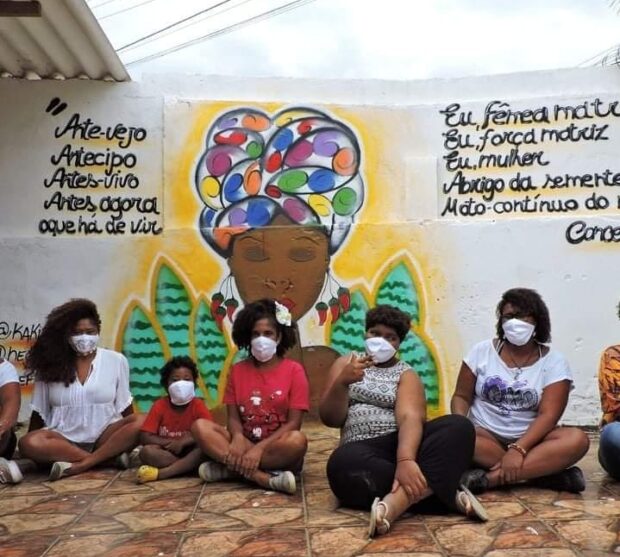
Accomplishing Projects Collectively
As Josefinas is a group composed of peripheral women from the West Zone that believe in the potential of their own territory. Besides the solidarity and support from the network, Colab helps women develop their strengths and alternatives to face the crisis created by the pandemic. “To see our power means to understand the structural systemic inequality and racism into which we are inserted, and to burst the bubble of this structure,” says Mariane Diaz, one of the network’s members.
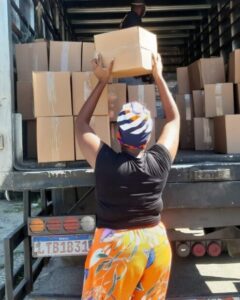 As Josefinas is a space for fostering peripheral female entrepreneurship that acts in a collective and collaborative manner. Projects are designed and proposed by participants themselves. To carry out actions on different fronts and strategies, in 2020, the #SupportAPeripheralWomanEntrepreneur campaign was launched encouraging the consumption of local products and giving visibility to the entrepreneurs that participate in the network, besides making courses and training that benefit these women available.
As Josefinas is a space for fostering peripheral female entrepreneurship that acts in a collective and collaborative manner. Projects are designed and proposed by participants themselves. To carry out actions on different fronts and strategies, in 2020, the #SupportAPeripheralWomanEntrepreneur campaign was launched encouraging the consumption of local products and giving visibility to the entrepreneurs that participate in the network, besides making courses and training that benefit these women available.
The growth of the project is felt by all who participate, as described by Aparecida: “I keep praying that the initiative gets more sponsors and supporters because its actions help us, and at the moment I would like to have more training courses.” One of the courses Aparecida is hoping for is personal finance. “I always take my money, mix it all up, and afterwards I don’t know what’s what, and end up without any. I would love a course in economics,” says Aparecida. She’s even given a name to this course: “How to Deal with Basic Finances for Homemakers,” suggests the entrepreneur.
About the authors:
Aira Nascimento, originally from Brazil’s Northeast, lives in Rio de Janeiro’s West Zone. She is the mother of Bento, wife of Gui, and founder of As Josefinas Colab and Cultural Space, besides being a project consultant.
Anna Lemos lives in the West Zone. A photographer trained in Visual Languages at the Parque Lage School of Visual Arts, she holds a degree in journalism and is a graffiti artist.
Flávia Domingues is a journalist, a specialist in social impact communication, a life entrepreneur. She lives in Campo Grande, in Rio’s West Zone.
Heloisa Mazza lives in Rio’s West Zone. She is a public school teacher and holds a master’s in International Cooperation in Education.
Mariane Diaz, born and raised in Rio’s West Zone, is an educator with a master’s in Education from the Federal Rural University of Rio de Janeiro (UFRRJ). A listener of tales and a teller of black stories, she currently lives in Bangu.
